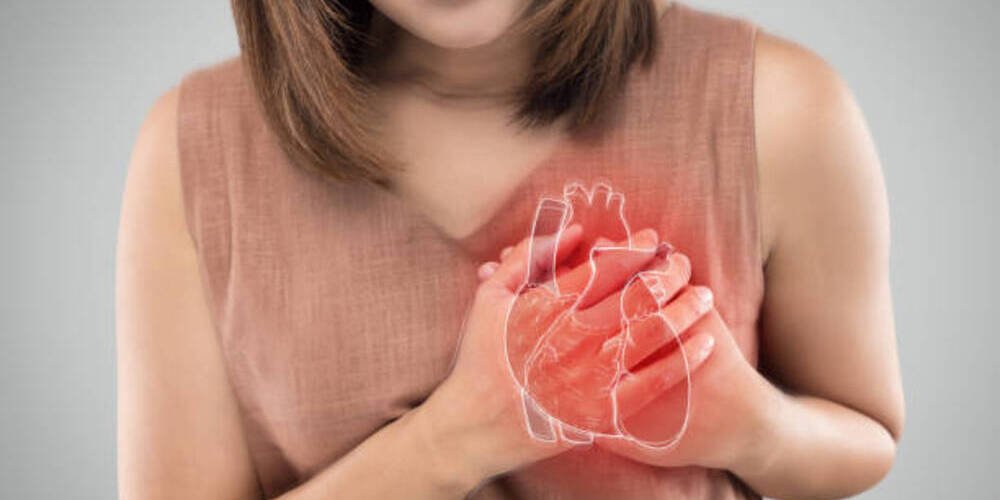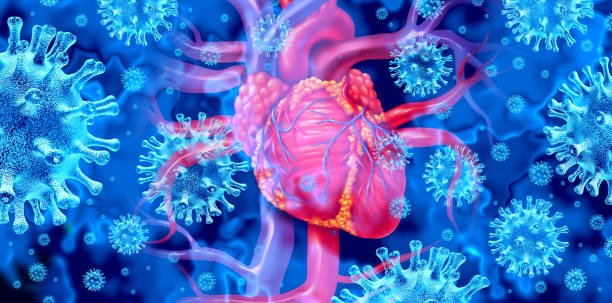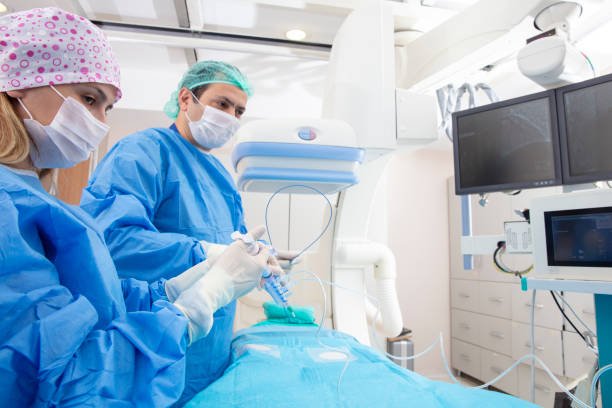
Myocarditis: Causes, Symptoms, Diagnosis, Treatment, Prevention Options
Inflammation is an immune response produced by the human body when it is invaded by viruses or bacteria. Although it helps fight germs and speed up wound recovery, inflammation of the heart is more serious. Related complications include endocarditis and myocarditis. wait. The following article will introduce the causes, symptoms, treatment and prevention of myocarditis.
What is myocarditis?
From the literal meaning, we can understand that myocarditis is an inflammation of the heart muscle, mainly caused by viral infection. After the virus invades the heart and causes inflammation, the patient’s heart pumping ability may be reduced, and the conduction of heart electricity may also be affected, and rapid or severe symptoms may occur. Abnormal heartbeat, also known as arrhythmia. In addition, myocarditis may also cause plaque to build up in the arteries of the heart, increasing the risk of stroke and myocardial infarction.
There are many causes of myocarditis, including infections by viruses, bacteria, and parasites, which may inflame the heart. The following are possible causes of myocarditis:
Viral infection
- Adenovirus
- Hepatitis B virus
- Hepatitis C virus
- Parvovirus B19
- Herpes simplex virus (HSV)
- Novel coronavirus (2019-nCov)
- Enteroviruses such as Coxsackievirus and Echovirus
- German measles
- Human herpesvirus type 4 (Epstein-Barr virus, EBV)
- Human herpes virus 6 (HHV-6)
- Human immunodeficiency virus (HIV)
Bacterial infections
- Staphylococcus aureus
- Streptococcus
- Corynebacterium diphtheriae
- Borrelia burgdorferi
- parasitic infection
- Trypanosoma cruzi
- Toxoplasma
- fungal infection
- Candida
- Molds, such as Aspergillus
- Histoplasma
- autoimmune diseases
- Rheumatoid arthritis
- Systemic Lupus Erythematosus (SLE)
- Takayasu arteritis
- Wegener’s granulomatosis (also known as Wagner’s granulomatosis)
- Giant cell arteritis (GCA)

Drug
Some cancer treatment drugs, antibiotics, anti-epileptic drugs and cocaine may cause myocarditis.
Types of myocarditis
Myocarditis can be classified into the following 4 types based on clinical pathology:
- Blast myocarditis
Fulminant myocarditis may be caused by rapid deterioration of acute myocarditis, or severe myocarditis symptoms caused by acute necrotizing eosinophilic myocarditis and giant cell myocarditis. Causes sudden cardiac death or multiple organ failure and requires immediate treatment. - Acute myocarditis
Patients with acute myocarditis who have significant ventricular dysfunction and respond to immunotherapy may also transform into dilated cardiomyopathy. - Chronic active myocarditis
Patients with chronic active myocarditis develop ventricular dysfunction associated with chronic inflammatory changes. - Chronic persistent myocarditis
The symptoms of chronic persistent myocarditis are persistent infiltration of inflammatory cells, chest pain, and palpitations, but ventricular function is normal.
Symptoms of myocarditis
There are many symptoms of myocarditis. People with mild symptoms may have chest pain or shortness of breath, or even have no symptoms at all. The following are symptoms that people with myocarditis may experience:
- chest pain
- Headache
- sore throat
- Difficulty breathing, rapid breathing
- fever
- Diarrhea
- tired
- arrhythmia
- swelling of lower limbs
- joint pain
Diagnostic approach to myocarditis
Early diagnosis is the key to preventing the expansion of myocarditis damage. The following are 6 diagnostic methods for myocarditis:
- Blood test:
Measure white blood cell and red blood cell counts, and detect heart enzymes such as troponin, creatine kinase, myoglobin, lactate dehydrogenase, etc. to learn more Whether the myocardium is damaged. - Electrocardiography (ECG or EKG for short):
It can display the current changes in the heart and detect whether there is abnormal heart rhythm. - Chest X-ray:
The shape and size of the heart can be observed, as well as whether there is fluid accumulation in the heart, which may be a sign of heart failure. - Echocardiography:
Use ultrasound to check the beating status of the heart and observe whether there is heart enlargement, blood pumping or valve problems. - Coronary angiography:
Commonly known as cardiac catheterization, a catheter is inserted into the blood vessels in the groin, arm or neck to reach the heart for observation. - Endomyocardial biopsy:
Doctors may take a small amount of myocardial tissue during cardiac catheterization to analyze the sample for inflammation or infection in the laboratory.

Groups prone to myocarditis
People who meet the following conditions have a higher chance of suffering from myocarditis. It is recommended that you pay special attention to your heart health. However, if you have symptoms related to myocarditis, please seek medical attention as soon as possible.
- Autoimmune diseases:
Patients with autoimmune diseases such as rheumatoid arthritis or systemic lupus erythematosus are more likely to develop myocarditis. - Young people:
Young people are more likely to develop myocarditis than middle-aged or older people. - Men:
Men are more likely to suffer from myocarditis than women, but women are more likely to suffer from autoimmune diseases such as systemic lupus erythematosus. - Genetic diseases:
Certain genetic diseases, such as Familial Mediterranean fever or Tumor necrosis factor receptor-associated periodic syndrome (TRAPS), may affect the body’s inflammatory response. - Alcoholism:
Excessive alcohol consumption can cause inflammation of the myocardium, affect heart function, and even lead to heart failure. - Cancer:
Not only do cancer patients have lower immunity, but they are also more susceptible to bacterial infections. Some drugs used to treat breast cancer, lung cancer, and lymphoma may also cause myocarditis. - Diabetes:
Diabetic patients have poor immunity, and many people are also obese. Not only may they increase their chances of infection and myocardial inflammation, but they also have a much higher risk of other heart diseases than ordinary people. - Skin problems:
If the skin is frequently traumatized and healed, there is a higher chance for bacteria to invade the human body. Therefore, patients with burns and scalds are also particularly susceptible to infection and myocarditis. - AIDS:
AIDS destroys the body’s immune system, making patients more susceptible to various bacterial infections. - Kidney disease:
Patients with end-stage renal disease have a higher chance of heart inflammation because there are many waste products in the blood that cannot be excreted. - Radiation therapy:
A small number of patients may develop myocarditis after receiving radiation therapy.
Complications of myocarditis
- Arrhythmia:
Damage to the heart muscle may affect the heart’s beating rate. - Heart failure:
Symptoms of heart failure may occur when the myocardium is damaged to a certain extent. Severe myocarditis may severely impair the heart’s pumping function, and the patient may need a ventricular assist device (VAD). , assisting the heart in pumping blood, or performing heart transplant surgery. - Myocardial infarction:
The heart’s pumping function is impaired, and blood that accumulates in the heart may form blood clots. If a blood clot blocks a coronary artery, it may cause a heart attack. - Stroke:
Similar to the former, it is caused by blockage of blood clots accumulated in the heart. If the blood clot blocks the cerebral blood vessels, it may lead to stroke. - Sudden cardiac death:
Severe arrhythmia may lead to cardiac arrest, which often results in death if immediate treatment is not provided.
Myocarditis Treatment
Mild myocarditis has a high chance of being cured on its own or treated with medication. Under mild symptoms, it is recommended to suspend competitive sports for 3 to 6 months to avoid worsening of myocarditis; however, if the symptoms are more severe, the following medications or other methods may be required for treatment. :
- Corticosteroids:
can suppress the human immune system, reduce inflammatory symptoms, and are suitable for the treatment of myocarditis caused by autoimmune diseases. - Diuretics:
such as furosemide, reduce excess body fluids. - Antibiotics:
used to treat myocarditis caused by bacterial infection. - Intravenous immunoglobulin (IVIG):
may help treat symptoms of myocarditis.
Heart failure treatment
Myocarditis may cause heart failure in patients, in which case the following methods may be used for treatment.
- Heart failure medications:
If heart failure is caused by myocarditis, your doctor may prescribe beta-blockers, Angiotensin Converting Enzyme Inhibitors (ACEIs), or angiotensin receptor inhibitors (ACEIs). Angiotensin Receptor Blocker (ARB) treatment to reduce the burden on the heart. - Intra-aortic balloon pump (IABP):
A catheter with a balloon is introduced into the inguinal artery and along the artery to the aorta of the heart. Through the inflation and deflation cycle of the balloon, the burden on the heart can be reduced and the The effect of increasing blood flow. - Ventricular assist device:
A mechanical pump that can be implanted in the heart to help a weak heart pump blood from the ventricles to all parts of the body. The machine could also help patients waiting for a heart transplant get through their waiting period. - Severe heart failure:
If the patient has severe heart failure due to myocarditis, Extra-Corporeal Membrane Oxygenation (ECMO) can be used to help the patient perform extracorporeal circulation while waiting for the opportunity of heart transplantation.
How to prevent myocarditis
The main way to prevent myocarditis is to reduce the chance of yourself being infected by germs. Of course, you can also help reduce the body’s inflammatory response by changing your lifestyle habits. This not only helps prevent myocarditis, but also helps prevent other heart diseases. The following are ways to prevent myocarditis 5 ways:
- Get vaccinated:
Getting vaccinated against influenza, rubella, etc. can help prevent viruses from attacking and causing infections. - Safe sex:
AIDS will reduce immunity and increase the chance of being infected by germs. - Good hygiene habits:
Keeping your body clean, such as washing your hands frequently, can help prevent bacterial infections. - Healthy lifestyle habits:
Quitting smoking, eating less fast food, processed foods and alcohol, maintaining a healthy weight and exercising moderately can maintain immunity and reduce the chance of developing diabetes or other cardiovascular diseases. - Beware of ticks:
Ticks carrying the bacterium Borrelia burgdorferi may bite people and cause them to develop Lyme disease, which can cause symptoms of myocarditis.












